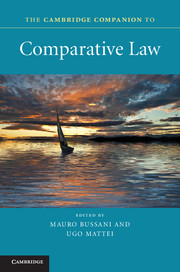Book contents
- Frontmatter
- Contents
- Contributors
- Abbreviations
- Preface
- Part I Knowing comparative law
- Part II Comparative law fields
- Part III Comparative law in the flux of civilizations
- 12 The East Asian legal tradition
- 13 The Jewish legal tradition
- 14 The Islamic legal tradition
- 15 The sub-Saharan legal tradition
- 16 The Latin American and Caribbean legal traditions
- 17 Mixed legal systems
- 18 Democracy and the Western legal tradition
- Index
15 - The sub-Saharan legal tradition
Published online by Cambridge University Press: 05 May 2013
- Frontmatter
- Contents
- Contributors
- Abbreviations
- Preface
- Part I Knowing comparative law
- Part II Comparative law fields
- Part III Comparative law in the flux of civilizations
- 12 The East Asian legal tradition
- 13 The Jewish legal tradition
- 14 The Islamic legal tradition
- 15 The sub-Saharan legal tradition
- 16 The Latin American and Caribbean legal traditions
- 17 Mixed legal systems
- 18 Democracy and the Western legal tradition
- Index
Summary
Introduction
The expression ‘African law’ refers to a legal family which is not comprehensive of the African continent as a whole. Northern Africa, namely where the Pharaonic, Persian, Alexandrine, Roman, and Ottoman empires ruled, has a history and legal framework with more in common with the Middle East and the Mediterranean area than with sub-Saharan Africa. South Africa, in turn, underwent an intense Europeanization process, which makes it different from other countries in the continent.
Africa as studied by the comparative lawyer is smaller than Africa measured by the geographer.
To present African law is not an easy task, since disparate realities characterized by contradictory elements coexist therein. Instead, to talk about single components of African law could be relatively easier. On one hand, authoritative law (both colonial and independent) is not very different from European law; it aims to oversee the administrative machine of governance, to manage credit instruments, and control trading companies. On the other hand, traditional law which continues to exist often regulates marriage and family institutions, land tenure regimes, the criminal law sector, and so on.
- Type
- Chapter
- Information
- The Cambridge Companion to Comparative Law , pp. 313 - 343Publisher: Cambridge University PressPrint publication year: 2012
- 2
- Cited by

